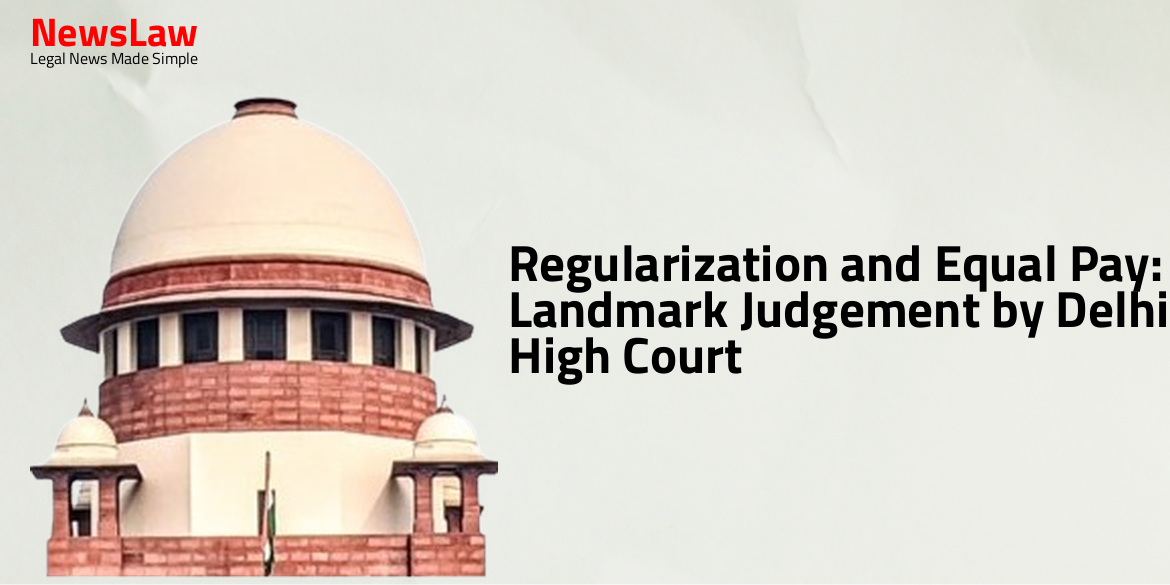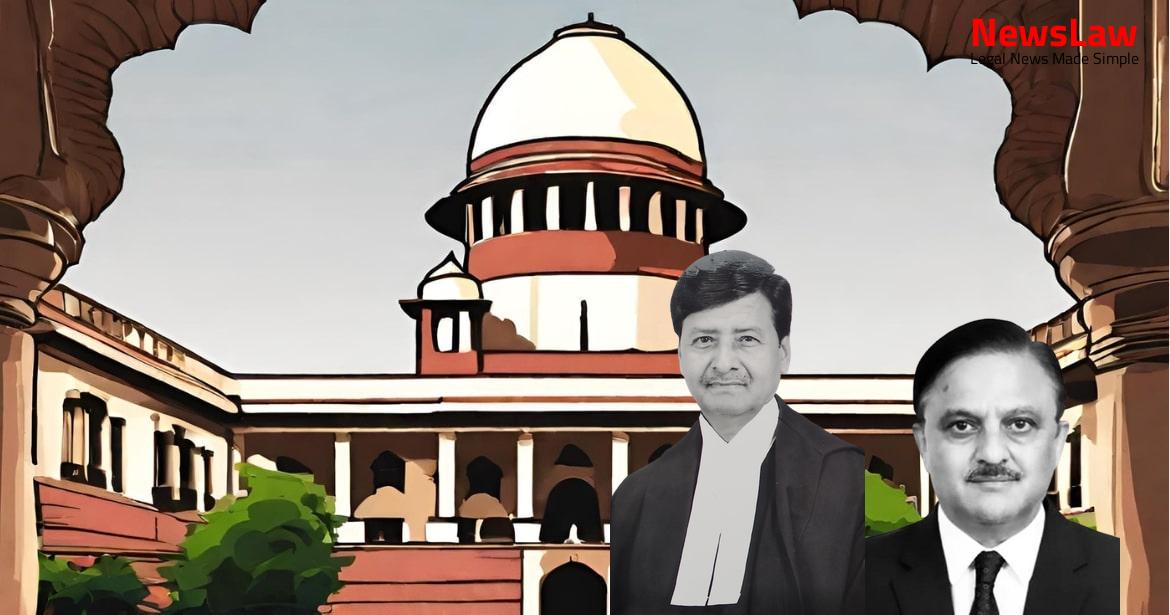In a crucial legal battle, former employees of Roadways clashed with Uttar Pradesh State Road Transport Corporation over pension entitlement. The Supreme Court of India delivered a landmark judgment that will have far-reaching implications for employee rights and pension benefits. The verdict resolves a longstanding dispute and clarifies the entitlements of employees in similar cases.
Facts
- Government Order issued on 28.10.1960 provided for pension to permanent employees of the erstwhile Roadways.
- Employees of Roadways were appointed temporarily as the department itself was temporary and were not members of regular service.
- Corporation was created on 01.06.1972 under the Road Transport Corporation Act, 1950.
- Rules were framed on 28.04.1982 for absorption of all employees of Roadways in the Corporation’s service.
- Appellants’ claim for pension is based on previous court judgments and representations made after the Division Bench judgment.
- Representation for pension claim was rejected which led to the filing of the writ petition.
- The High Court of Judicature at Allahabad passed a common order in various writ applications and special appeals.
- This judgment disposes of a batch of civil appeals that arose from the High Court’s order.
- The appeals were heard together due to their commonality in relation to the High Court’s decision.
Also Read: Makhan Singh vs. State of Bihar: Upholding Rights Recognized by Consolidation Authorities
Issue
- Appellants are former employees of Uttar Pradesh Roadways, a temporary department of the State Government.
- The question is whether the appellants hold any pensionable post before or after their absorption in the U.P. State Roadways Transport Corporation.
Also Read: Tapas Kumar Das vs. HPCL: LPG Distributorship Location Dispute
Arguments
- The appellants argue that they are entitled to pension as they were appointed before the establishment of the Corporation in 1972.
- They claim that no rule or regulation after the Corporation’s establishment excluded their posts from being pensionable.
- Referring to an amendment in 1977 to Article 350 of U.P. Civil Service Regulations, they assert that employees of all establishments under the State Government are deemed to be on a pensionable post unless excluded.
- By combining a Government Order from 1960 with the 1977 amendment, the appellants believe they are entitled to pension benefits.
- They cite judgments in the cases of Mirza Athar Beg, S.M. Fazil, and Narain Pandey to support their entitlement to pension under general provisions of Article 350 of the Regulations.
- Ms. Garima Prasad, senior counsel for the Corporation, argued that the appellants had already availed post-retiral benefits under the Employees Provident Fund Scheme.
- The claim by the appellants was dismissed due to significant delay ranging from 8 to 32 years.
- It was emphasized that the service conditions of Roadways employees before absorption into the Corporation were not protected by relevant government orders, hence they were not entitled to pensions.
- The appellants were distinguished from previous cases where employees were working on pensionable posts.
- Employees appointed after the creation of the Corporation were deemed ineligible for pension benefits based on specific government orders and regulations.
- The High Court dismissed the writ petition citing delay and laches, and also rejected the claim on merits after discussing relevant government orders and regulations.
- The Division Bench upheld the decision of the Single Judge on all material issues, including the claim for parity with previous cases.
- The Roadways was classified as an industry according to legal tests, leading non-gazetted posts to not qualify for pensions as per the regulations.
Also Read: Appellant Convicted for Culpable Homicide Not Amounting to Murder
Analysis
- The Government Order dated 28.10.1960 provided pension to permanent employees of the Roadways.
- Employees who opt for service in the Corporation are entitled to pension and retirement benefits.
- Temporary employees, except those mentioned in specific categories, are not entitled to pension as per the GO dated 28.10.1960.
- The Service Regulations of 1981 specify that only State Government employees absorbed in the Corporation are entitled to pension.
- Employees who had been promoted to pensionable posts after 1982 are entitled to pension as per the Regulations.
- Mirza Athar Beg and S.M. Fazil cases discussed – Fazil’s claim for pension, gratuity and commutation without considering earlier services till 05.11.1956.
- The appeal of Uttar Pradesh State Road Transport Corporation dismissed by the Division Bench of High Court in Special Appeal No 780 (S/B) of 2013.
- In the matter of V.K. Ramamurthy vs. Union of India & Anr., the Court held that contributory provident fund retirees cannot switch over from Provident Fund Scheme to Pension Scheme as they form a different class.
- Section 12 of the Provident Fund Act protects the wages and specified benefits of an employee under the scheme.
- Similarly, employees of Oil Natural Gas Commission were not entitled to claim pensionary benefits without complying with the Regulations.
- The judgments emphasize that pension is a right and not a bounty, and employees must establish their entitlement to pension under a specific rule or scheme.
- Members of the Union of RKSP who were promoted to a pensionable post after the cutoff date of 27.08.1982 are not entitled to pension, as acknowledged by Ms. Garima Prasad, senior counsel for UPSRTC.
- The Division Bench of the High Court was deemed incorrect in ruling that RKSP members are entitled to pension even if promoted after the cutoff date.
- Employees promoted in UPSRTC to a pensionable post between 1972 to 1981 receive pension according to a Government Order dated 03.02.1984.
Decision
- The appeals filed by UPSRTC are allowed, while the appeals filed by Roadways Karamchari Sanyukta Parishad, UP are dismissed.
- The order passed by the Division Bench and the learned Single Judge of the Allahabad High Court is set aside.
- Employees can carry over unused leave to the following year, up to a maximum of 30 days.
- Immediate implementation of the orders in the G.O. is directed.
- Conditions of service, except for those specifically mentioned, will remain the same.
- Extra wages at twice the ordinary rate will be paid for work performed beyond prescribed hours.
- Abatement is set aside and applications for substitution are allowed.
- Five days of festival holidays in a calendar year are granted, subject to government rules.
- Services can be terminated on one month’s notice or payment in lieu of notice.
- Compensation holidays are to be given if an employee is deprived of scheduled days of rest.
Case Title: UP ROADWAYS RETIRED OFFICIALS AND OFFICERS ASSOCIATION Vs. STATE OF U.P.
Case Number: C.A. No.-000894-000894 – 2020



